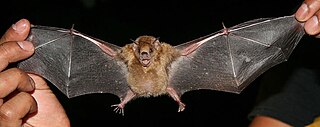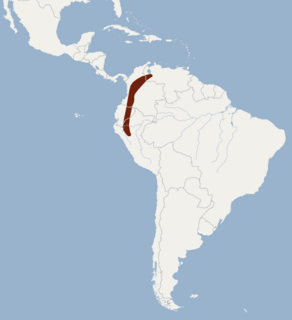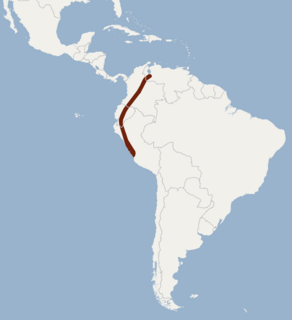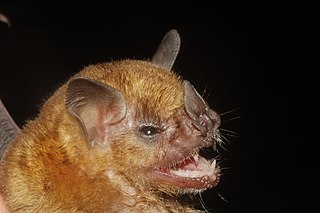
The New World leaf-nosed bats (Phyllostomidae) are found from southern North America to South America, specifically from the Southwest United States to northern Argentina. They are ecologically the most varied and diverse family within the order Chiroptera. Most species are insectivorous, but the phyllostomid bats include within their number true predatory species and frugivores. For example, the spectral bat, the largest bat in the Americas, eats vertebrate prey, including small, dove-sized birds. Members of this family have evolved to use food groups such as fruit, nectar, pollen, insects, frogs, other bats, and small vertebrates, and in the case of the vampire bats, even blood.

The little yellow-shouldered bat is a bat species from South and Central America. It is a frugivore and an effective seed disperser.

Tilda's yellow-shouldered bat is a bat species found in Bolivia, Brazil, Colombia, Ecuador, French Guiana, Guyana, Peru, Suriname, Venezuela, and Trinidad and Tobago.

Aratathomas's yellow-shouldered bat is a species of bat in the family Phyllostomidae native to South America.

Sturnira known as a yellow-shouldered bat or American epauleted bat, is a genus of bat in the family Phyllostomidae. The genus name comes from the Latin for "starling" and refers to HMS Starling, which took part in an 1836 voyage to Brazil during which the type specimen was collected. It contains the following species:

The bidentate yellow-shouldered bat is a species of bat in the family Phyllostomidae. It is found in South America.

The Bogotá yellow-shouldered bat is a species of bat in the family Phyllostomidae. It is found in Colombia, Ecuador, Peru, and Venezuela at altitudes from 300 m to above 2000 m, particularly in cloud forest. The species is primarily frugivorous; it may also consume nectar and pollen.

The highland yellow-shouldered bat is a species of bat in the family Phyllostomidae. It is found in Colombia, Costa Rica, Ecuador, El Salvador, Guatemala, Guyana, Honduras, Mexico, Nicaragua, Panama, and Venezuela.

Louis's yellow-shouldered bat is a species of bat in the family Phyllostomidae. It is found in Colombia, Costa Rica, Ecuador, Panama, and Peru.

The greater yellow-shouldered bat is a species of bat in the family Phyllostomidae. It is found in Bolivia, Colombia, Ecuador, and Peru.

The Talamancan yellow-shouldered bat is a species of bat in the family Phyllostomidae. It is found only in Costa Rica and Panama, and there are no subspecies.

The lesser yellow-shouldered bat is a species of bat in the family Phyllostomidae. It is native to Peru and Ecuador. It is threatened by habitat loss.

Tschudi's yellow-shouldered bat is a species of leaf-nosed bat indigenous to Argentina, Ecuador, and Peru, with its range also encompassing Bolivia.

Sturnira honurensis is a species of bat found in Central America. Previously, it was considered a subspecies of the highland yellow-shouldered bat, but it has been considered distinct since 2010.
Burton's yellow-shouldered bat is a species of leaf-nosed bat found in Panama and Costa Rica.

Sturnira koopmanhilli is a species of leaf-nosed bat found in South America.
Anoura aequatoris is a species of microbat that lives in South America in the countries of Bolivia, Colombia, Ecuador, and Peru.

Sturnira bakeri is a species of bat found in South-America.

Sturnira parvidens is a species of leaf-nosed bat found in Central America.
Sturnira angeli, also known as the Guadeloupe yellow-shouldered bat or Angel's yellow-shouldered bat, is a species of bat in the family Phyllostomidae. It is endemic to the Lesser Antilles. As of 2018 it is listed as near threatened by the IUCN.

















